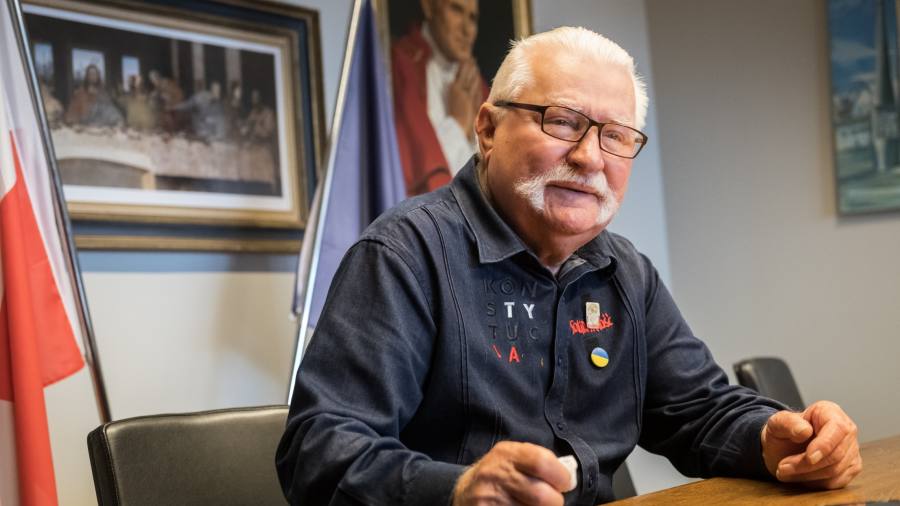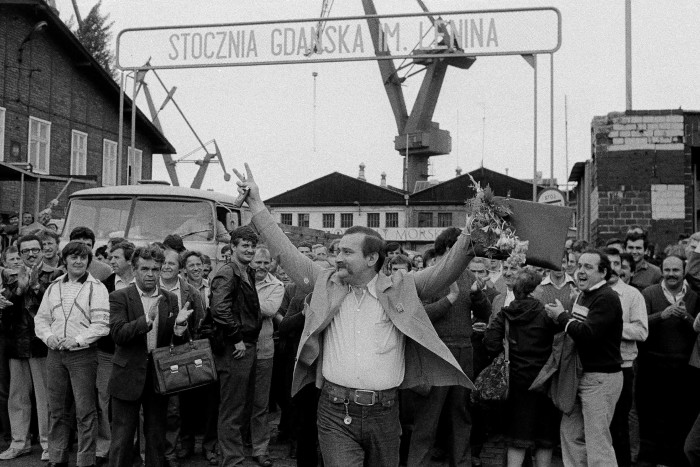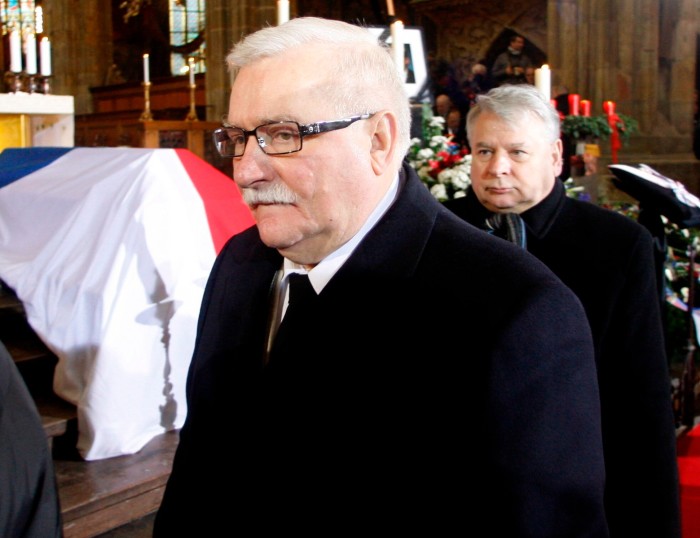
Jarosław Kaczyński, leader of Poland’s ruling party, should go to prison for abuse of power if his rightwing government loses elections in October, according to Lech Wałęsa, the country’s first president after the fall of the Berlin Wall.
The call for post-election sentencing made by Poland’s Nobel Peace Prize winner underscores the high stakes of the upcoming election in which opposition leader Donald Tusk is seeking to oust Poland’s most powerful politician Kaczyński and his Law and Justice (PiS) party after eight years in power.
“Kaczyński has been eliminating some of the fundamentals for a democracy, like the separation of powers and freedom of the press,” Wałęsa said in an interview with the Financial Times.
The PiS leader himself has described October’s parliamentary election as the most important since that of 1989, which paved the way for Poland’s return to democracy. Asked whether he agreed with this comparison, Wałęsa said the upcoming vote was indeed crucial, and “for Kaczyński for sure: if he loses, he’ll go to prison”.
Since coming to power in 2015, PiS has appointed loyalists to the constitutional court, changed laws to punish judges and misused the control it has over state media. These all were reasons why a Tusk-led government should prosecute Kaczyński and his allies, according to Wałęsa.
“It’s not a witch hunt but a question of justice: we cannot accept the breaking of constitutional laws and abuses of power,” Wałęsa said. “The witch hunt is when accusations are false and exaggerated, but here we have enough proof.”
The European Commission has withheld billions of EU funds over PiS’s moves against the independence of judges. In May, the ruling party came under fresh criticism from Brussels and Washington after it adopted a law against pro-Russia activities, which could ban politicians from holding office. The opposition has dubbed it “Lex Tusk”, arguing their leader is the law’s main target.
The rivalry between Kaczyński and Tusk goes back decades and has intensified over the years. In 2010, the rightwing leader accused Tusk, the then prime minister, of colluding with the Kremlin to kill his twin brother Lech, who was then president, in a plane crash in Russia. In 2021, after seven years in Brussels as president of the European Council, Tusk returned to domestic politics, promising to remove “the evil” that Kaczyński and PiS brought to Poland.
Tusk has also pledged legal action against his longstanding nemesis if his Civic Platform party wins the election. In a social media video, Tusk pointed at a billboard advertising jobs for prison guards and said: “They know there will be a lot of work: I will keep my promise.”
Prison threats are “not a good sign” for those hoping the Polish judiciary will be more politically independent after the election, said Bartosz Pilitowski, co-founder of Court Watch Poland, an organisation that monitors the judiciary.
Even if the chances of a leading politician landing in prison are slim, “having charges hanging over you for a long time makes life pretty miserable”, said Tomasz Wróblewski, a former newspaper editor and president of the Warsaw Enterprise Institute, a think-tank.
Asked about his fallout with the Kaczyńskis in the mid-1990s, Wałęsa told the FT that “they were trying to use the methods that actually belonged to the old [communist] system, like spreading slanders”.
As president, Wałęsa fired the Kaczyński twins as his presidential advisers amid policy disputes and their alleged involvement in “scams”, he said. Wałęsa failed to get re-elected in 1995, and Kaczyński has since continued to accuse him of having worked as an informant for the Polish secret police in the 1970s.
Wałęsa claims that documents alleging he had been an agent codenamed Bolek were doctored, and a case against him was dismissed in 2000 by a court that ruled there was no evidence of spying.
On Thursday, Poland celebrates its Day of Solidarity and Freedom, to commemorate the 1980 agreement to end a strike that Wałęsa led as a Gdańsk shipyard electrician. That strike resulted in the creation of the Solidarity trade union, which grew into a nationwide movement against communist rule. Wałęsa’s struggle won him the Nobel Peace Prize 40 years ago.
Wałęsa, 79, now presides over a think-tank housed within the impressive museum devoted to Solidarity. Although retired from politics, Wałęsa spoke alongside Tusk at a huge pro-democracy rally in Warsaw in June against the “Lex Tusk” law.
In the interview, Wałęsa praised Tusk, 66, for connecting with a younger generation: “Tusk is now better than me because he is reading better the demands of the times, may be also because he is less burdened by the past.”
Poles differ significantly in their appraisal of Wałęsa. Many believe the single-mindedness that helped him against the communists proved detrimental during his presidency and made him deaf to others’ proposals.

“Whatever you can say or think here in Poland about him now, he is welcomed by everybody wherever he goes, not only because he got a Nobel Prize but because he actually did this transformation totally peacefully,” said former prime minister Jan Krzysztof Bielecki, who is close to Tusk.
Asked whether an apology about past wrongdoings could now help burnish his domestic legacy, Wałęsa insisted he had nothing to feel guilty about.
“Most accusations against me stem directly from envy,” he said. “They thought somebody must have been standing behind me, and when they couldn’t find anybody, then they said I was an agent.”
